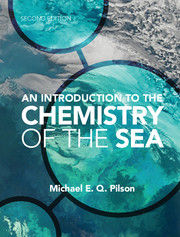Book contents
- Frontmatter
- Contents
- Preface
- Acknowledgments
- 1 Introduction
- 2 The water in seawater
- 3 Salinity, chlorinity, conductivity, and density
- 4 Major constituents of seawater
- 5 Simple gases
- 6 Salts in solution
- 7 Carbon dioxide
- 8 Nutrients
- 9 Trace metals and other minor elements
- 10 Radioactive clocks
- 11 Organic matter in the sea
- 12 Anoxic marine environments
- 13 Exchanges at the boundaries
- 14 Chemical extraction of useful substances from the sea
- 15 Geochemical history of the oceans
- Appendix A The chemical elements
- Appendix B Symbols, units, and nomenclature
- Appendix C Physical properties of seawater
- Appendix D Gases
- Appendix E Carbon dioxide
- Appendix F Dissociation constants and pH scales
- Appendix G Solubility of calcium carbonate
- Appendix H Effects of pressure
- Appendix I Radioactive decay
- Appendix J Geochemical reservoirs, and some rates
- Appendix K Sound absorption
- Epilogue
- Questions for chapters
- Glossary
- References
- Index
- Miscellaneous end matter
- References
7 - Carbon dioxide
Published online by Cambridge University Press: 05 February 2013
- Frontmatter
- Contents
- Preface
- Acknowledgments
- 1 Introduction
- 2 The water in seawater
- 3 Salinity, chlorinity, conductivity, and density
- 4 Major constituents of seawater
- 5 Simple gases
- 6 Salts in solution
- 7 Carbon dioxide
- 8 Nutrients
- 9 Trace metals and other minor elements
- 10 Radioactive clocks
- 11 Organic matter in the sea
- 12 Anoxic marine environments
- 13 Exchanges at the boundaries
- 14 Chemical extraction of useful substances from the sea
- 15 Geochemical history of the oceans
- Appendix A The chemical elements
- Appendix B Symbols, units, and nomenclature
- Appendix C Physical properties of seawater
- Appendix D Gases
- Appendix E Carbon dioxide
- Appendix F Dissociation constants and pH scales
- Appendix G Solubility of calcium carbonate
- Appendix H Effects of pressure
- Appendix I Radioactive decay
- Appendix J Geochemical reservoirs, and some rates
- Appendix K Sound absorption
- Epilogue
- Questions for chapters
- Glossary
- References
- Index
- Miscellaneous end matter
- References
Summary
. . . we are carrying out a tremendous geophysical experiment of a kind that could not have happened in the past or be repeated in the future
Roger Revelle 1956The study of the carbon dioxide system, the other buffers in seawater, and the so-called alkalinity of seawater has historically been a major focus of research by chemical oceanographers. The importance of this system is evident in the following considerations:
The carbon dioxide system is responsible for about 95% of the acid–base buffering over the normal range of pH in ordinary seawater. On short timescales (up to at least several thousand years), the pH of seawater is controlled mostly by this system, and changes in pH are caused mostly by changes in the various components of the CO2 system.
Short-term changes in the concentration of total CO2 in seawater are due largely to the photosynthetic and respiratory activities of organisms, so a great deal can be learned about biological activity by monitoring this system.
The vexed questions associated with the problems of precipitation and solution of calcium carbonate in the oceans can only be approached on the basis of a thorough understanding of the CO2 system itself.
The climate of the Earth is strongly affected by the concentration of CO2 in the atmosphere, although the exact quantitative relationships are still subject to investigation.
The reservoir of CO2 in the oceans is much greater than that in the atmosphere, so small changes in processes affecting the oceanic reservoir could have comparatively large effects on the concentration in the atmosphere.
Humans are significantly increasing the atmospheric concentration of CO2, and the oceans play an important role in modulating this increase.
- Type
- Chapter
- Information
- An Introduction to the Chemistry of the Sea , pp. 114 - 175Publisher: Cambridge University PressPrint publication year: 2012



